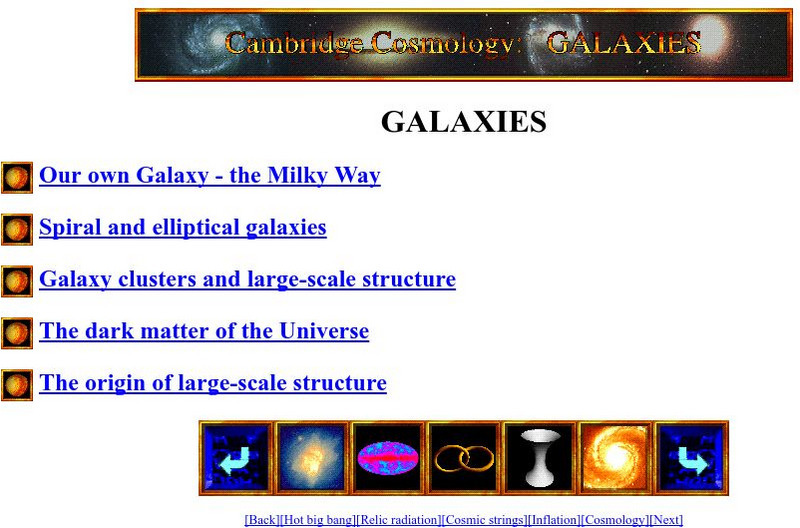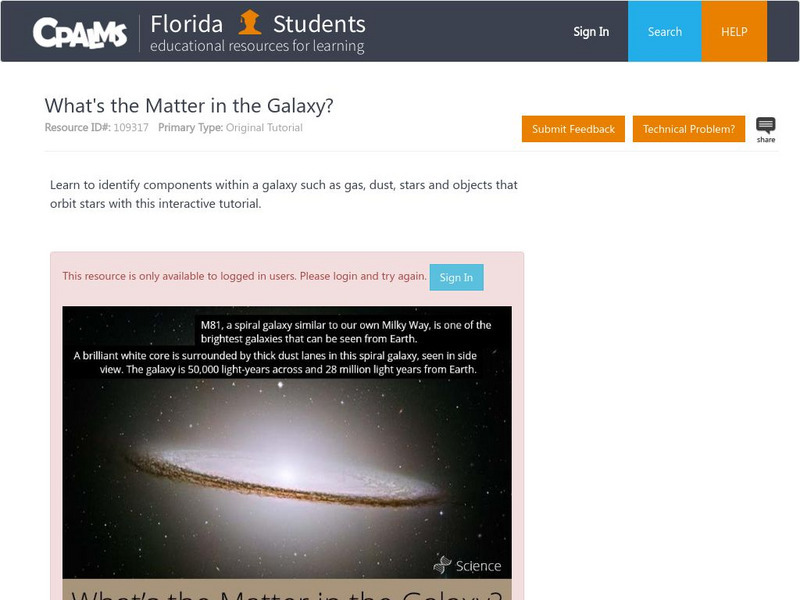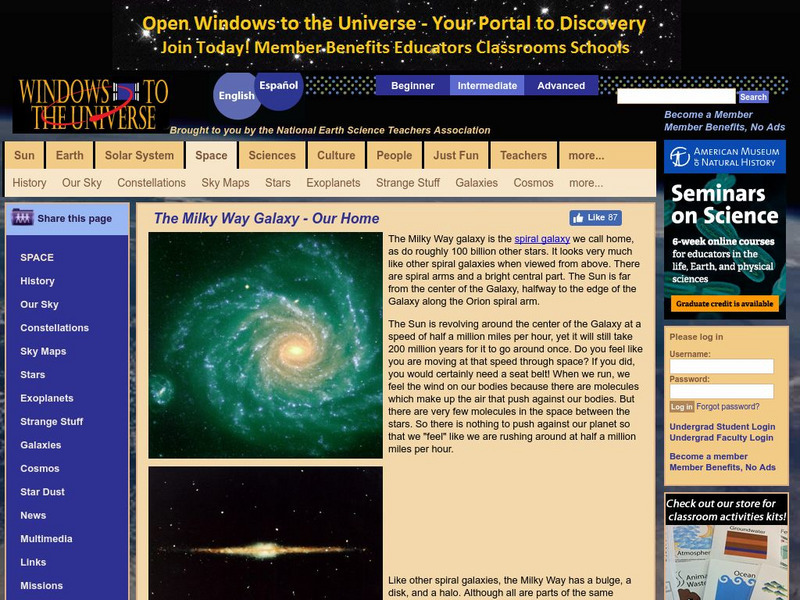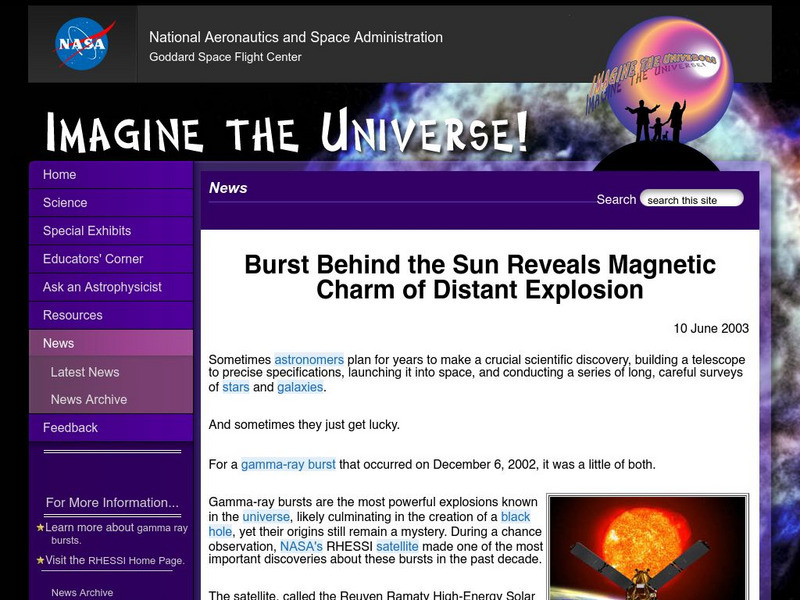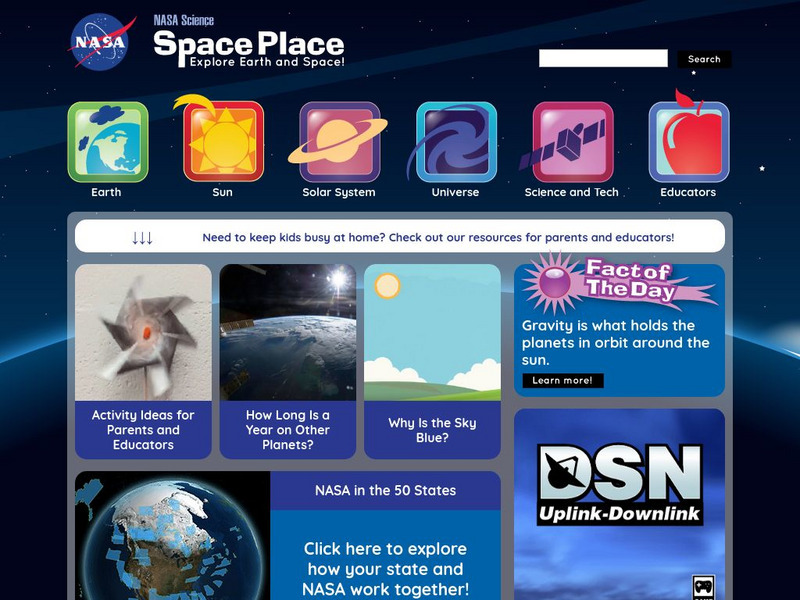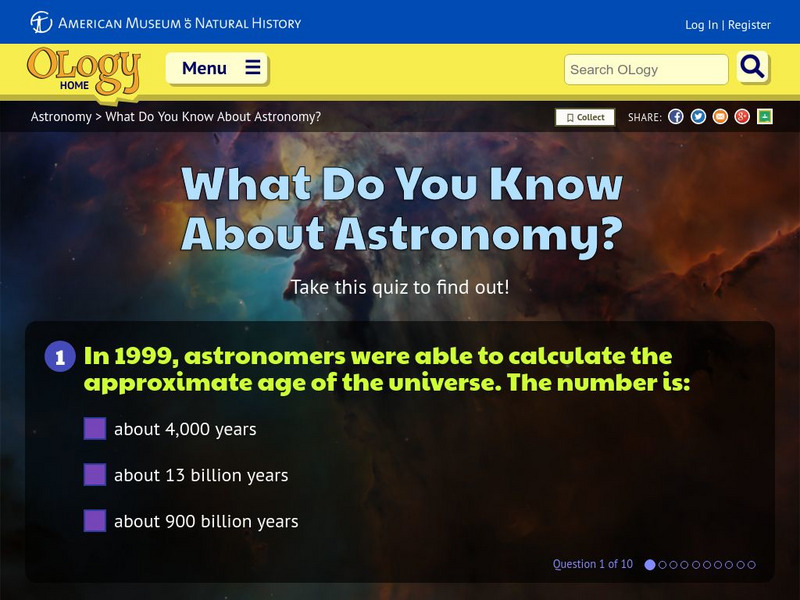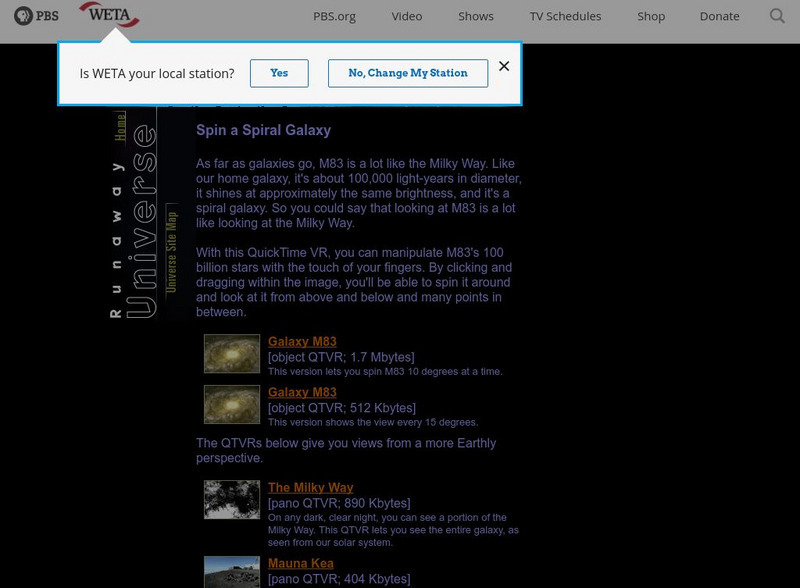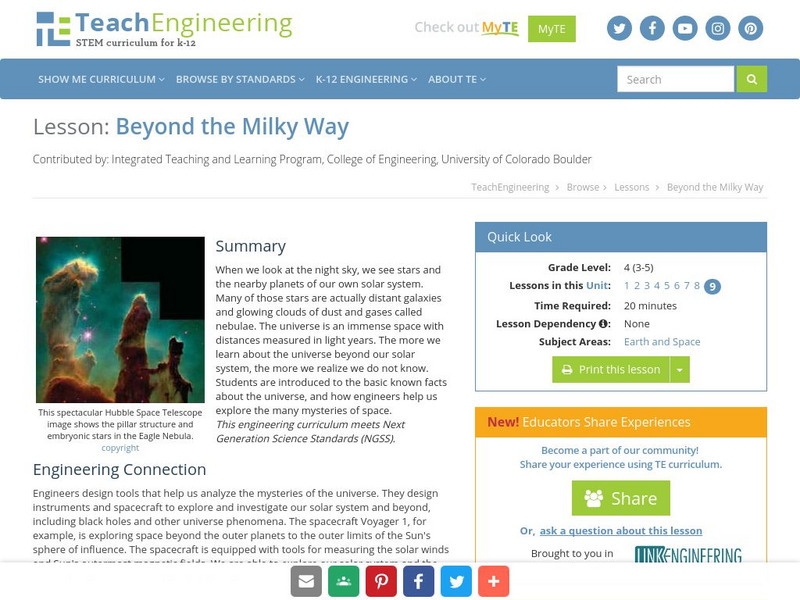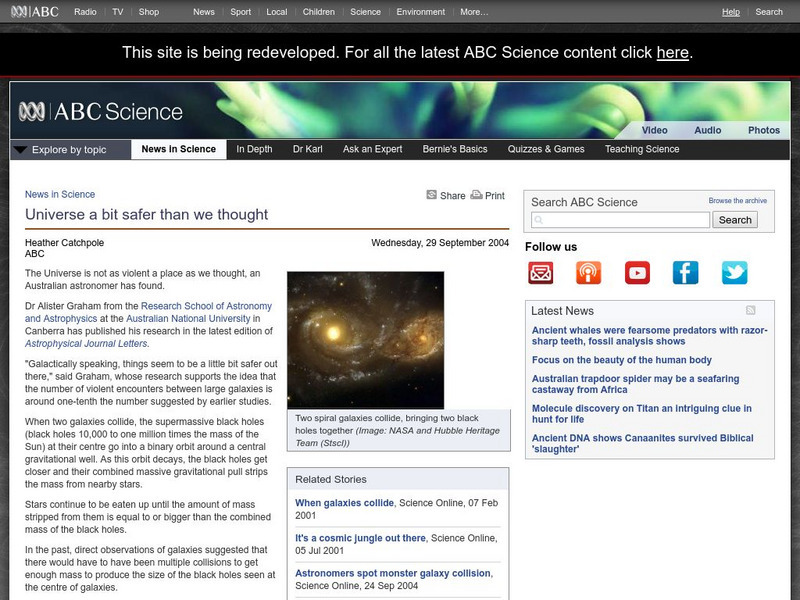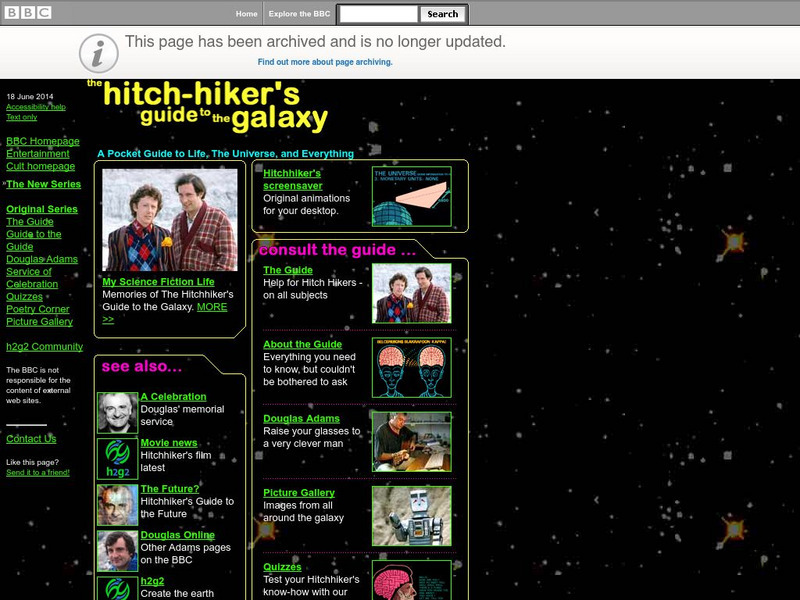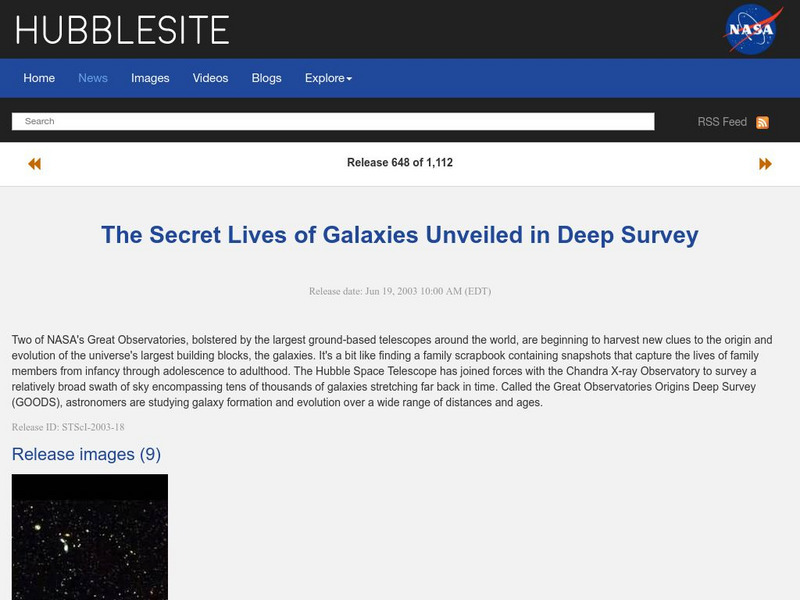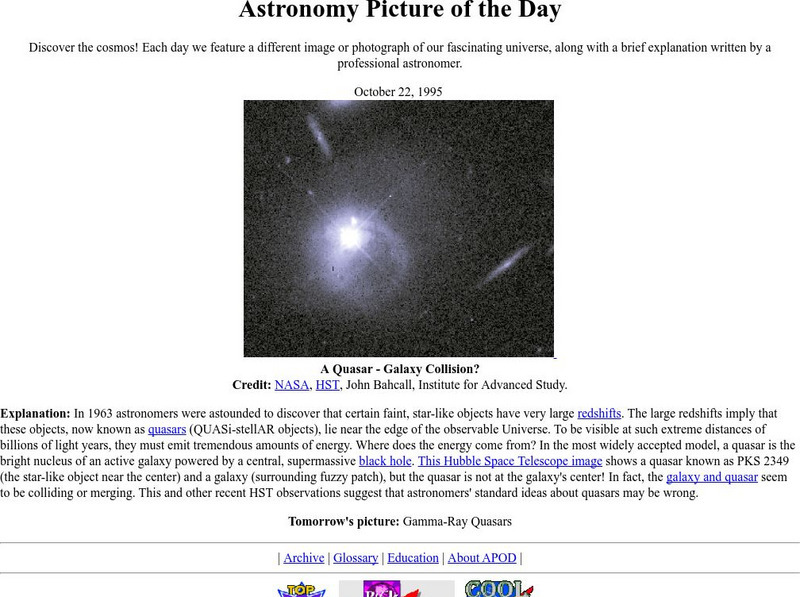Other
University of Cambridge Cosmology: Galaxies
This site from the University of Cambridge allows you to view information on spiral, elliptical, and Milky Way galaxies, as well as galaxy clusters. Provides basic facts about each one.
Space Telescope Science Institute
Galaxy Hunter: A Cosmic Photo Safari
Travel the universe and learn about galaxies. Investigate Hubble Deep Field observations to learn more.
NASA
Nasa: Astronomy Picture of the Day: Edwin Hubble 1889 1953
Part of the NASA website, this is a reprint of an article in the Journal of the Royal Astronomical Society of Canada about Edwin Hubble's life and accomplishments, stressing his role in the development of modern astronomy.
Harvard University
Chandra X Ray Observatory: Video Podcasts: The Incredible Two Inch Universe
A set of podcasts outlining a four-step process for understanding the vastness of our universe, from the vicinity of the Earth and Moon, out into distant galaxies. Downloadable instructions and a handout are included, as well as...
Wikimedia
Wikipedia: The Black Hole
This site examines the black hole as an object in astrophysics. Delve into this comprehensive resource that covers this concept from its history, to qualitative physics, the reality of black holes, mathematical physics and more.
CPALMS
Florida State University Cpalms: Florida Students: What's the Matter in the Galaxy?
A tutorial that looks at the components within a galaxy such as gas, dust, stars and objects that orbit stars. A PDF file of the tutorial is available.
National Earth Science Teachers Association
Windows to the Universe the Milky Way Galaxy
Learn what Milky Way galaxy is made of and what it looks like, as well as how it relates to other known galaxies. Read "Questions and answers about the Milky Way" for further information.
NASA
Nasa: Imagine the Universe: "Burst Behind the Sun"
Site provides the article, "Burst Behind the Sun Reveals Magnetic Charm of Distant Explosion," that details on a gamma-ray burst that occurred on December 6, 2002. Provides graphics and links to learn more about gamma-ray bursts.
Space Telescope Science Institute
Nasa: Hubble Space Telescope: Universe
At this site from HubbleSite you can discover the universe by taking a look back toward the beginning of time. Site contains links to information on planets, stars, galaxies, and much more.
NASA
Nasa: Star Child: Elementary Astronomy Unit
Learn everything you can about outer space with this interactive astronomy unit. 2 levels of difficulty with modules on the solar system, the universe, other "space stuff" and a glossary of terms. Links for parents and other great website.
NASA
Nasa: Imagine the Universe: "Nasa Detects One of Closest"
Site provides the article, "NASA Detects One Of Closest And Brightest Gamma Ray Bursts." Provides links to learn more about gamma rays and black holes as well as other resources.
American Museum of Natural History
American Museum of Natural History: O Logy: What Do You Know? Astronomy
Take this ten-question self-scoring quiz to test your knowledge of astronomy facts: age of the universe, why stars and planets are spheres, where other life might exist in the outer space, the Milky Way, and more.
PBS
Pbs Nova Online: Spin a Spiral Galaxy
PBS site provides various views of spiral galaxies. (Quick Time required) With this technology, you can manipulate the image to spin it around and look at it from various angles.
A&E Television
History.com: The Space Race: Interactive Universe
A virtual journey through space offers photos and facts about Earth and its neighboring planets, comets, other celestial bodies of the Solar System, and the Milky Way and Andromeda galaxies.
TeachEngineering
Teach Engineering: Beyond the Milky Way
When we look at the night sky, we see stars and the nearby planets of our own solar system. Many of those stars are actually distant galaxies and glowing clouds of dust and gases called nebulae. The universe is an immense space with...
Australian Broadcasting Corporation
Australian Broadcasting Corporation: News in Science: Universe a Bit Safer Than We Thought
From ABC News in Science, Heather Catchpole's article explores issues related to the collision of galaxies and the subsequent formation of black holes.
BBC
Bb Ci: The Hitchhiker's Guide to the Galaxy
Fun site containing information about the world created by the book. Also contains links to information on the author, Douglas Adams.
University of Wisconsin
University of Wisconsin: The Constellations and Their Stars
An excellent site dedicated to the constellations and information about the objects which make them up. Contains a great deal of information about various stars, galaxies and other objects, as well as details on how best to observe them.
University of California
University of California Berkeley: Classifying Galaxies
Find out how galaxies are classified and then see if you can apply that knowledge to identify the different types of galaxies. In addition to explaining Hubble's galaxy classification system, the site has links to Hubble Space Telescope...
PBS
Pbs Learning Media: Spin a Spiral Galaxy
This interactive activity from NOVA Online lets you spin a spiral galaxy, including our own Milky Way. It demonstrates that what you can learn from visible light observations of a galaxy is largely determined by the angle from which you...
Space Telescope Science Institute
Hubble Site: Secret Lives of Galaxies
This site is provided by HubbleSite from NASA. "Telescopes around the world are beginning to harvest new clues to the origin and evolution of the universe's largest building blocks, the galaxies." Site offers links to images, video,...
Other
University of Leicester: Spiral Galaxies
Provides a general overview of spiral galaxies, including descriptions of the different classes of spiral galaxy.
NASA
Astronomy Picture of the Day: Quasar Galaxy Collision
An image of a quasar. The large redshifts imply that quasars lie near the edge of the observable universe and must emit tremendous amounts of energy. There are also many embedded links to related topics.
Curated OER
Astro Lab: Space, a Contemporary Vision of the Universe
Explore how our contemporary understanding of the universe came to be. This overview looks at the history of three main areas of study, namely space, time, and the arrangement of matter.
